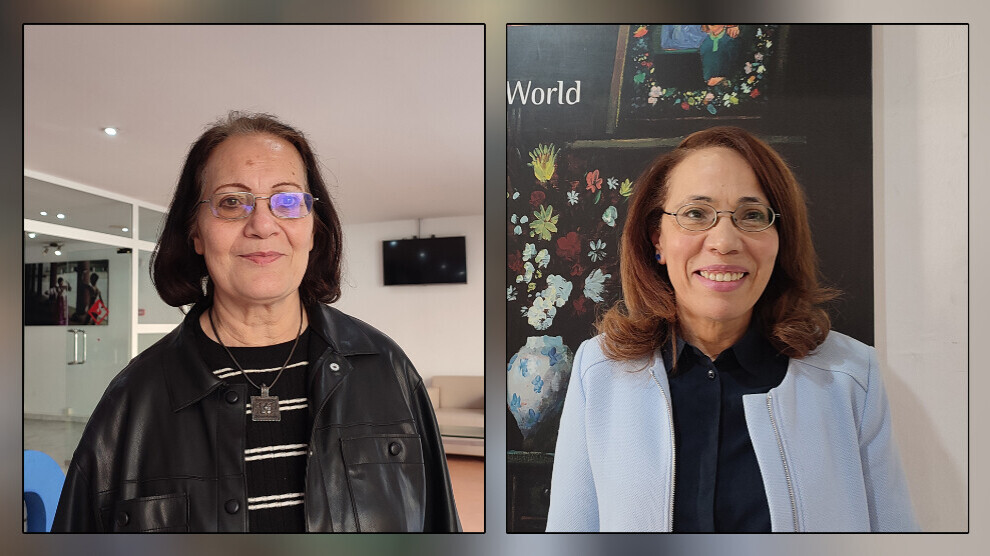Tunisian women: Chauvinist regimes practice genocidal policy against Iranian women and minorities
Iranina women are fighting for freedom and equality to live respectfully not to be enslaved.

ZOUHOUR MECHERGUI
Tunis – Since the killing of Jina Mahsa Amini, young Kurdish women, Iranin women have led the demonstrations and protests in Iran and Eastern Kurdistan, rejecting any guardianship of their bodies.
In 1970s, Iran was liberal state respecting women’s choices, and a role model of feminism. But since the Islamic revolution in 1979, women have been deprived of their freedom and forced to wear hijab.
Women have suffered from the authority of that revolution, as they are deprived of their rights to work equally with men and to practice a normal life. The authority considers women the greatest burden against its discriminatory policy.
The situation of Iranian women has not changed since the Islamic Revolution took power, which is based on religion and power, not civil state and its laws are based on Islamic law.
Since the protests that sparked in Iran and Eastern Kurdistan following the killin of Jina Mahsa Amini, women have been at the frontline of the protests with their strength, steadfastness and feeling of responsibility. They are the most prominent victims in Iran, victims of the oppression of authority and the patriarchal society. Today, free feminist voices face all forms of abused and arrest with policy of forcing them to keep silent while women reject the policies against them and their society and revolt against them without fear.
Their suffering is similar to the suffering faced by the Kurdish women who are targeted by the Turkish forces that occupy their region. They are subjected to various forms of violence, but they struggle with the strength of belonging, love of their home land and the dream of stability, construction and safe life in a pluralistic and democratic country that ensures their rights.
The combination of religion and authority increase Iranina women's suffering
Salwa Qiqa, a Tunisian human rights activist and a specialist of NE Syria and Middle East said: “Women are always the most affected by the policies and practices of the Iranian regime. The patriarchal mentality, which considers itself the only one capable of ensuring a safe life and a better future for women, makes women’s lives worse. Chauvinist regimes practice a genocidal policy against Iranian women and minorities. Iranian and Kurdish women face a genocide as a result of an ideology that rejects differences."
From the womb of violence and suffering, the revolution breaks out
Salwa Qiqa confirmed that violence against the minorities in Iran and NE Syria causes natural reactions by society demanding freedom and real democracy by taking to the streets to protest massacres and the policy of suppression against protests and uprising so that the Iran regime uses force to silence the voices of the free women.
She pointed out that violence against Iranian and Kurdish women in Turkey and NE Syria is always ignored, mentioning the killing of Jina Mahsa Amini and pioneering women of Rojava who led the revolution against the Turkish occupy and took up arms to liberate their homeland and took part in the fight against armed terrorist organizations. She also talked about Yazidis women’s fight to liberate themselves from the grip of ISIS.
Stressing that it is time for women of the Middle East and North Africa to unite against the suffering of women and to put pressure on the autocratic, tyrannical authorities considering women second-class citizens, to make decisive decisions.
Salwa Qiqa called for the development of a special feminist strategic vision to put an end to the current violence becoming terrorism targeting women and terrorizing them under the protection of the patriarchal system and oppressive power. She said, “The time has come for us to unite as women against all policies that target and shackle us and place guardianship over our bodies and freedoms. In the 21st century, there are the Universal Declaration of Human Rights and the various agreements and conventions supporting women; however, they do not support and protect women in Iran and NE Syria suffering from genocidal policies, and women all around the world. We, as women, have the power to fight all policies against us if we unite.”
